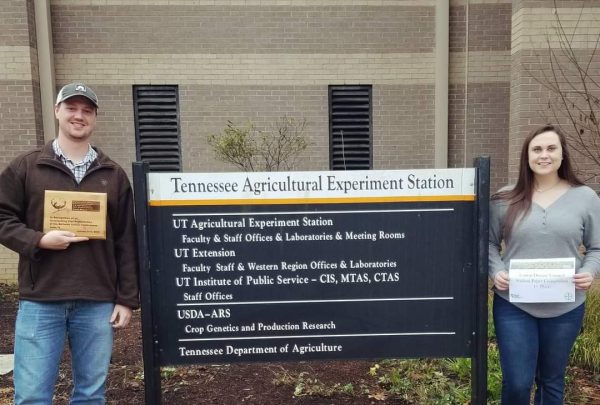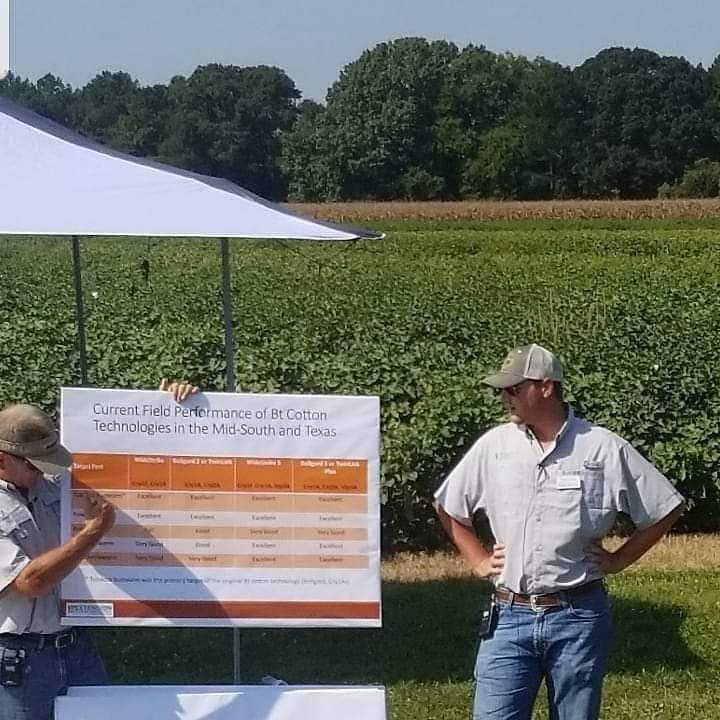
Fueled by his upbringing, Dawson Kerns, a doctoral student in the Department of Entomology and Plant Pathology, is dedicated to understanding a major cotton pest, bollworm, and its resistance mechanisms. After receiving a bachelor’s degree in entomology from Texas A&M University and a master’s degree from The University of Tennessee, Knoxville, Kerns embarked on his Ph.D. journey in 2020 under the guidance of Professors Juan Jurat-Fuentes and Scott Stewart. With a focus on bollworms (Helicoverpa zea), a significant threat to cotton crops, Kerns’ research aims to answer research questions related to insecticidal protein resistance.
Q&A with Dawson Kerns
Can you tell me a little bit about yourself?
I grew up in Arizona, Texas, and Louisiana. So, I usually just tell people I am from Texas, because that is where the majority of my family resides. In high school, I was involved in the Future Farmers of America and spent my summers scouting and working in cotton fields. These experiences opened my eyes to the role that entomology plays in agriculture and shaped my desire to pursue a career in entomology. I graduated from Texas A&M University with a B.S. in entomology and, under Dr. Scott Stewart, I received an M.S. with a concentration in entomology from the University of Tennessee. I began my Ph.D. in 2020 under Dr. Juan Luis Jurat-Fuentes and Dr. Scott Stewart. My research investigates resistance to insecticidal proteins in a major cotton pest called bollworm (Helicoverpa zea).
What is your current concentration?
I don’t know how to concentrate (Bioinformatics, Genomics, and Molecular Interactions).
What is your latest research question?
My latest project focused on determining the resistance mechanism to a Bt protein called Vip3Aa in a resistant colony of Helicoverpa zea. The protein targets specific receptors in the insect’s gut. So, I wanted to determine if binding of the protein to these receptors was reduced in resistant insects. The expectation was that if binding was reduced, there would likely be some kind of alteration to the receptor that results in resistance.
Can you tell me a little more about your research?
I work with bollworm, which is a major pest in cotton. One of the ways this pest is managed is through the use of genetically modified cotton plants that express insecticidal proteins activity against bollworm. The genes that allow the plants to produce these proteins originally came from the bacterium, Bacillus thuringiensis, which is why these technologies are referred to as Bt crops. These crops are great tools because Bt proteins have a narrow range of activity so only target pests are affected, and growers don’t need to spray insecticides as often which can save them time and money.

The problem is that bollworm populations can develop resistance to Bt proteins, which can drastically limit the benefits of Bt crops. So, my goal is to investigate the mechanisms that allow insects to become resistant to Bt proteins and to identify resistance alleles. Doing this will allow us to make informed decisions regarding how to overcome resistance and aid in monitoring field populations to assess the prevalence of resistance.
What were your primary obstacles in answering this question?
Doing these experiments involved radiolabeling Vip3Aa proteins so that they could be detected if they bound to their target receptors. This task was very tedious and getting the right conditions for proper binding took months… and months.
What academic class has been your favorite and why?
Insect Physiology was my favorite class. I enjoyed insect physiology in my undergrad, and I enjoyed it again when I took it here, at the University of Tennessee. The instructor, Dr. Juan Luis Jurat-Fuentes is very good at explaining detailed processes in a way that is easy to understand. He could probably find a way to explain quantum physics to a five-year-old. What I particularly appreciate about insect physiology is its ability to provide insight into the intricate processes that allow an insect to function in an environment.
How has your academic training at The University of Tennessee prepared you for a career in the industry?
My master’s research was mostly fieldwork. During my master’s project, I had the opportunity to interact with growers and speak at field days. So, I got a lot of applied and Extension experience. However, with my Ph.D. project, I am mostly in the laboratory and my research involves a lot of molecular work. These experiences have provided me with an expansive skillset that I believe will open up a lot of opportunities for me. I have also had the opportunity to participate in academic conferences and collaborate with other scientists in my field. Ultimately, I believe that my experiences at the University of Tennessee have enabled me to gain recognition in my field and develop the abilities necessary to thrive in a professional setting.
How has your academic training at The University of Tennessee prepared you for a career in the industry?
My master’s research was mostly fieldwork. During my master’s project, I had the opportunity to interact with growers and speak at field days. So, I got a lot of applied and Extension experience. However, with my Ph.D. project, I am mostly in the laboratory and my research involves a lot of molecular work. These experiences have provided me with an expansive skillset that I believe will open up a lot of opportunities for me. I have also had the opportunity to participate in academic conferences and collaborate with other scientists in my field. Ultimately, I believe that my experiences at the University of Tennessee have enabled me to gain recognition in my field and develop the abilities necessary to thrive in a professional setting.

What has been the highlight of your graduate school experiences so far?
The other members of my lab have been a pleasure to work with. My advisors have been great mentors to me, and my involvement in the graduate student association has given me a lot of wonderful memories. However, my best experiences are those that I have had with my fiancee, Shelly Pate.
What do you believe is your biggest academic achievement?
When I started my Ph.D., I had little molecular lab experience. I consider my biggest academic achievement to be getting my molecular experience to the point where I can be a valuable resource to others in the lab. I take great pleasure in being able to use my experience to help others solve issues they are facing or accomplish a goal.
What kind of extracurricular activities do you participate in?
I am currently the Vice President of the Entomology and Plant Pathology Graduate Student Association.
What are your two favorite hobbies?
I like to watch really bad reality TV shows with Shelly. Occasionally, Corey Day and I will play disc golf at Victor Ashe Park (although we aren’t very good at it yet).
What are your favorite things to do on campus?
Publix has $5 sushi on Wednesdays, so it’s fun to load up on cheap sushi and go to the UT Gardens to look at the flowers and feast. I also enjoy attending the football games.
Any advice you would like to share with a prospective student?
I would like to share a quote by Ray Wylie Hubbard: “The days that I keep my gratitude higher than my expectations, I have really good days”. When we start graduate school we all have great ambitions and high expectations. However, those high expectations can really discourage us when we face adversity. It is important to be grateful for the little victories because it is those little victories that will carry us through the times when our research isn’t going how we envisioned it. If you accept that things are never likely to go exactly as planned and focus on the small things, then you will ultimately be much more successful in graduate school.
Is there anything that you would like to add?
Shoutout to Teneria and Tonya for helping me ship tons of dry ice packages over the course of my Ph.D.
